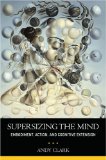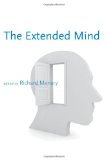Extended mind – books & resources
Written on June 24, 2010
A new book from MIT Press reflects the current state of debate on the extended mind concept & I’ve collected some related titles and links below: The Extended Mind (Life and Mind: Philosophical Issues in Biology and Psychology), ed. by Richard Menary (MIT Press, 2010) (link for UK)
Product description from the publisher:
Where does the mind stop and the rest of the world begin? In their famous 1998 paper “The Extended Mind,” philosophers Andy Clark and David Chalmers posed this question and answered it provocatively: cognitive processes “ain’t all in the head.” The environment has an active role in driving cognition; cognition is sometimes made up of neural, bodily, and environmental processes. Their argument excited a vigorous debate among philosophers, both supporters and detractors. This volume brings together for the first time the best responses to Clark and Chalmers’s bold proposal. These responses, together with the original paper by Clark and Chalmers, offer a valuable overview of the latest research on the extended mind thesis. The contributors first discuss (and answer) objections raised to Clark and Chalmers’s thesis. Andy Clark himself responds to critics in an essay that uses the movie Memento’s amnesia-aiding notes and tattoos to illustrate the workings of the extended mind. Contributors then consider the different directions in which the extended mind project might be taken, including the need for an approach that focuses on cognitive activity and practice.
Contributors: Fred Adams, Ken Aizawa, David Chalmers, Andy Clark, Stephen Cowley, Susan Hurley, James Ladyman, Richard Menary, John Preston, Don Ross, Mark Rowlands, Rob Rupert, David Spurrett, John Sutton, Michael Wheeler, Rob Wilson
Table of contents & sample chapter (Introduction) at MIT Press
- link to original 1998 paper by Clark & Chalmers
- two related books by Andy Clark: (1) My introduction to the idea was in Natural-Born Cyborgs: Minds, Technologies, and the Future of Human Intelligence (Oxford University Press, 2003, 2004). (link for UK)
Product description from the publisher:
From Robocop to the Terminator to Eve 8, no image better captures our deepest fears about technology than the cyborg, the person who is both flesh and metal, brain and electronics. But philosopher and cognitive scientist Andy Clark sees it differently. Cyborgs, he writes, are not something to be feared–we already are cyborgs. In Natural-Born Cyborgs, Clark argues that what makes humans so different from other species is our capacity to fully incorporate tools and supporting cultural practices into our existence. Technology as simple as writing on a sketchpad, as familiar as Google or a cellular phone, and as potentially revolutionary as mind-extending neural implants–all exploit our brains’ astonishingly plastic nature. Our minds are primed to seek out and incorporate non-biological resources, so that we actually think and feel through our best technologies. Drawing on his expertise in cognitive science, Clark demonstrates that our sense of self and of physical presence can be expanded to a remarkable extent, placing the long-existing telephone and the emerging technology of telepresence on the same continuum. He explores ways in which we have adapted our lives to make use of technology (the measurement of time, for example, has wrought enormous changes in human existence), as well as ways in which increasingly fluid technologies can adapt to individual users during normal use. Bio-technological unions, Clark argues, are evolving with a speed never seen before in history. As we enter an age of wearable computers, sensory augmentation, wireless devices, intelligent environments, thought-controlled prosthetics, and rapid-fire information search and retrieval, the line between the user and her tools grows thinner day by day. “”This double whammy of plastic brains and increasingly responsive and well-fitted tools creates an unprecedented opportunity for ever-closer kinds of human-machine merger,”” he writes, arguing that such a merger is entirely natural. A stunning new look at the human brain and the human self, Natural Born Cyborgs reveals how our technology is indeed inseparable from who we are and how we think.

(2) Clark’s more recent book – Supersizing the Mind: Embodiment, Action, and Cognitive Extension (Philosophy of the Mind) (Oxford University Press, 2008) (link for UK)When historian Charles Weiner found pages of Nobel Prize-winning physicist Richard Feynman’s notes, he saw it as a “record” of Feynman’s work. Feynman himself, however, insisted that the notes were not a record but the work itself. In Supersizing the Mind, Andy Clark argues that our thinking doesn’t happen only in our heads but that “certain forms of human cognizing include inextricable tangles of feedback, feed-forward and feed-around loops: loops that promiscuously criss-cross the boundaries of brain, body and world.” The pen and paper of Feynman’s thought are just such feedback loops, physical machinery that shape the flow of thought and enlarge the boundaries of mind. Drawing upon recent work in psychology, linguistics, neuroscience, artificial intelligence, robotics, human-computer systems, and beyond, Supersizing the Mind offers both a tour of the emerging cognitive landscape and a sustained argument in favor of a conception of mind that is extended rather than “brain-bound.” The importance of this new perspective is profound. If our minds themselves can include aspects of our social and physical environments, then the kinds of social and physical environments we create can reconfigure our minds and our capacity for thought and reason.
- two more books on the extended mind:
The Extended Mind: The Emergence of Language, the Human Mind, and Culture (Toronto Studies in Semiotics and Communication) by Robert K. Logan (U of Toronto Press, 2008) (link for UK)
Cognitive Systems and the Extended Mind (Philosophy of Mind) by Robert D. Rupert (Oxford University Press, 2009) (link for UK) - Plus a forthcoming book (Oct) by philosopher Mark Rowlands: The New Science of the Mind: From Extended Mind to Embodied Phenomenology (Bradford Books) (link for UK)
- additional links –
[added 6/27] “Extended mind hypothesis” at Brain Hammer (from Key Terms in Philosophy of Mind)
Filed in: cognitive science,mind,philosophy of mind.




I want to read one of these books (for now) as an introduction. Leaning toward The Extended Mind. Agree?
Hi John, Good question! I’d recommend Andy Clark’s ‘The Natural-Born Cyborg’ as a very accessible introduction. ‘The Extended Mind’ would give a more academic pro and con perspective. Quite a bit of ‘The Extended Mind’ is
available online to “try before you buy”: you could check out the original Clark & Chalmers paper that I linked to, plus MIT Press has the introduction as a sample pdf. Some papers from the book are also available through the extended mind section at PhilPapers.
Thanks for visiting & happy reading!
this is why yogis became very precise in making distinctions between mind, awareness, consciousness, etc … we interchange the words around because we are actually not at all precise in knowing about reality (of course there is “extended mind”, that is the starting point for precision)
and you know sanskrit has five words for aspects of mind that we have not yet come to see ..